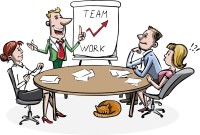- Home
- Business Processes
- Industry Knowledge
- Aerospace Industry
- Automotive Industry
- Banking Domain
- BFSI Industry
- Consumer/ FMCG Industry
- Chemicals Industry
- Engineering & Construction
- Energy Industry
- Education Domain
- Finance Domain
- Hospitality Domain
- Healthcare Industry
- Insurance Domain
- Retail Industry
- Travel and Tourism Domain
- Telecom Industry
- Leadership Skills
- eLearning
- Home
- Leadership
- Project Leadership
- Creating Highly Effective Teams
Creating Highly Effective Teams
How do we create effective teams? What comes to mind when you think about an effective team? High performing teams exhibit accountability, purpose, cohesiveness, and collaboration. It is a team that works seamlessly as a whole. Everyone brings unique talents and strengths and support each other to bring out the best in everyone. How do you create one?
Effective teamwork is essential in today’s world. Based on your experience you would have noticed that a team does not become effective from the very onset. For teams to function effectively, they must be created properly. It is really challenging to do things right in the beginning to make sure that you get the level of effectiveness you desire when you're putting together a new team. The task is much easier if you have a plan in place. This article summarizes a practical, step-by-step process for building and maintaining an effective team.
1: Pre-work - Analyze and Plan:
Most managers rush into the work of setting up the team without getting clear agreements in the beginning about where they are going or how they want to get there. Clarifying and understanding your expectations from the new team upfront will help you determine its structure and will set up your team for success.
Do the Pre-work in stage1 itself. Understand the nature of work that needs to be accomplished. Determine if a team is necessary to accomplish the task. Once you have established the need for the team, begin by defining the goal of your team. What is its ultimate purpose that this team must aim for? What are your expectations from the members of the team? How will your team contribute to your organization's goals and mission? What authority the group should have?
Then create a Team Charter to help clarify your team's objectives. Focus on the aspects listed below while creating a charter and clarify each of these aspects of teamwork. Discuss the questions listed and record your agreements. Many of these questions can be answered immediately. Others will need to be answered or modified as you get into the formation stage.
- What is the purpose of this team? Why does it exist? Why is it worth investing in this time and effort?
- What shared values are needed to guide how we approach our work and how we work with each other?
- How does success look like for this team? How will we measure success?
- To whom is the team accountable? How will we track and report progress on commitments and action items?
- What planning and problem-solving process are we going to use? What are the timeframes?
- How will we make decisions? What decisions can be made by subgroups and what decisions need to be made by the whole team?
- What are the deliverables?
- What are the team’s approval matrix and authority? Do any decisions require outside approval? If so, how will approval be obtained?
- How will we organize to accomplish the work? What is the best structure? What roles are needed?
Try to ensure that no tasks or responsibilities overlap unnecessarily between roles, as this could cause problems later on.
2: Onboarding – Getting the Right People on Bus:
Once you've defined your goals, and have identified the roles and the structures, the next step is to identify and make a list of the type of people that you want on your team. Focus on the questions listed below to have a better understanding of the talent and expertise you need for your team:
- Who are the members of the team and what are their primary areas of expertise?
- What strengths should each person have?
- Is any other expertise needed or any technical ability expected?
- Are there any behavior expectations – for example, a positive attitude, emotional intelligence, or a collaborative spirit to the team?
- Are there any other groups or individuals that need to be represented or consulted?
- How the team is financially supported? Do we have the materials and technology needed?
- Are the time demands on team members understood and considered reasonable?
- What information do we need? Do we have access to all the information we need?
- Do our team members need any special training?
Great managers know that talented people are their greatest resource, and the hardest asset to find and keep. The key to build an effective team is to spend an inordinate amount of time on people issues: finding, recruiting, developing, coaching, and providing feedback to them. Start by spending time to ensure that the team consists of all personnel necessary to do the job. The next step is to recruit and establish boundaries by deciding who is and is not in the team. When you bring new people on board, make sure that you recruit effectively and professionally. Analyze your roles and build a recruitment process that ensures the best possible talent to fill these roles.
3: Create Performance Conditions:
During this phase arrive at an agreement regarding the tasks to be performed with your new team members and also take the opportunity to clarify the behaviors expected of each team member. Use your Team Charter to build an understanding of team objectives. Each person should clearly understand the goals of the group and should know how these fit with your organization's overall objectives.
Establish Key Performance Indicators (KPIs) linking your team's tasks to your organization's goal and objectives and use these indicators to start managing performance. Team members should be clear about the definitions of these KPIs and must understand how they affect them directly so that they understand their deliverables and how they will be measured. Provide all the needed materials and equipment to do the job effectively.
4: Build Trust:
As your team begins to work together, allow some time for people to get to know one another, as at this stage you need to establish a way each team member can exchange ideas and build mutual trust. Successful groups are built on trust and collaboration. A free exchange of ideas, in an open environment, will allow your team to get to know each other and enable you to check on how they work together. You might even want to consider conducting team-building exercises to help build team trust and establish personal bonds.
Setting up a series of informal meetings, early on in your project, offers an ideal opportunity for team member exploration. Like other teams, your people will also most likely progress through several predictable stages of team formation and help them bond with each other, as they move from being strangers to form a cohesive team. Use this time to discuss your project, delegate particular tasks, set individual roles, and discuss objectives. Always make sure that everyone involved understands every stage of their involvement.
5: Provide Ongoing Assistance:
A good team will satisfy its internal or external clients, become stronger as a unit as time passes, and foster the learning and growth of its individual members. You may want to conduct an assessment of the training needs of your members to explore whether people need further training, or need specific opportunities to develop their skills. You may refer to the expectations you captured in the team charter and based on your observations chart a developmental plan to help new team members build the skills they need. Many team leaders and organizations limit training to the induction stage but an ongoing training process will help them become more effective.
6: Motivate, Reward, or Provide Feedback:
One of the most important roles that you have as a team manager is that of keeping individuals motivated and energized to keep working for organizational goals. Try to tailor your efforts based on the different needs of each individual (refer to the Situational Leadership Model). Building effective teams is a continuous process – keep revisiting each step of this process on a regular basis.
Related Links
You May Also Like
-
Creating Highly Effective Teams
How do we create effective teams? What comes to mind when you think about an effective team? High performing teams exhibit accountability, purpose, cohesiveness, and collaboration. It is a team that works seamlessly as a whole. Everyone brings unique talents and strengths and support each other to bring out the best in everyone. How do you create one?
-
Benefits of Teams in Workplace
The use of formal work teams is commonplace in modern organizations. But why we have teams? What are the benefits or advantages that teams provide for organizations and employees? Do we really need to adopt formal team structures and use team-building approaches in organizations? Read this article to explore and learn the benefits of having formal teams in organizations.
-
Laissez-faire is a style of leadership that affords the group members a great deal of independence. Tasks are delegated to the group members and they are responsible to see the project through to fruition. Research has shown that this style of leadership leads to the lowest levels of productivity. This article explains this style and covers the implications of having a hands-off approach and the situations where this style could be effective.
-
Team leadership theory is a recent leadership theory that does not discriminate between the leader and the other team members. The approach considers contributions from each team member to be critical for organizational success. This approach focused on the overall team effectiveness and team problems are diagnosed and action is taken to remediate weakness. This approach provides for taking corrective action when the leader deems necessary.
-
All the teams are dynamic in nature and they take time to come together, they form, develop, and grow in stages, over a period of time. Teams go through five progressive stages: Forming, Storming, Norming, Performing and Adjourning. In this article, we want to introduce you to these stages of team development and certain strategies that you can use to help the team grow and develop in each of these stages.
-
Teams are part of the modern organizational culture. Whether you are a team leader or a team member, having a better understanding of how teams work, and being able to identify where the team is in the process, is a critical part of ensuring the team is ultimately successful. Start with the basics and understand what a team is and what role they play in an organization.
-
Have you ever noticed how we express ourselves or interact with each other? Have you ever wondered what communication is and what role it plays in our lives? One may wonder if communication is so omnipresent and integral to our lives, why study communication at all? We need to study communication because it is a complex process that consists of many elements and is also beset with a number of barriers and there is a need to remove the barriers so that the communication process is effective.
-
Evidence of the medically damaging symptoms of work stress necessitates applying the treatment of stress management. Stress management is increasingly drawing the attention to the management experts not only as a remedial measure but also as a way to resource management. If the workplace can be made a little more lovable the increase in the achievement of the organization may be much time more. If group stress can be removed by introducing group discussions and recreational facilities a long-lasting team spirit may get developed.
-
Tips for Effective Time Management
After studying and analyzing how time is spent, why time is wasted, and where time is wasted you need to decide about the changes required for effective utilization of time. For this purpose, a large number of remedial measures can be taken by you. The first and foremost determinant of a planned and purposeful utilization of time is to develop consciousness of the value of time at all levels of the organization. Planning, goal setting, and defining priorities are concerns to addressed immediately.
-
Building Perfect Creative Team
One misconception around creativity is that creative act is essentially solitary. Most of the world's important inventions resulted not from the work of one lone genius, but from collaboration of a team with complementary skills. Managers should build teams with the ideal mix of traits to form a creative group and then establish the conditions that make creativity much more likely to occur.
Explore Our Free Training Articles or
Sign Up to Start With Our eLearning Courses

About Us
Learning
© 2023 TechnoFunc, All Rights Reserved










